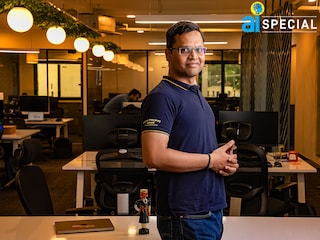Sarvam AI's Pratyush Kumar and Vivek Raghavan on building AI for Bharat
Chosen to build India's sovereign AI model, Pratyush Kumar and Vivek Raghavan shoulder a massive responsibility


An important achievement for Pratyush Kumar and Vivek Raghavan came about in April when the government of India selected their startup Axonwise—better known as Sarvam AI after the models they’re developing—to build the country’s first sovereign large language model (LLM).
Kumar and Raghavan founded Sarvam in July 2023 and they have released some models built on top of existing open-source ones and one they’ve developed on their own. Their aim is to bring AI to Bharat, not just English-speaking affluent segments of India.
The sovereign AI mandate sets them on the path to create India’s own population-scale generative AI model, one that is effective in delivering results in Indian languages, being context-aware with respect to local nuances and cultural aspects of the diversity that exists in India.
“This is such a critical technology that the debate about whether to build our own is already settled," Kumar tells Forbes India. “We need strategic autonomy, the ability to build and control our own AI infrastructure".
Sarvam’s selection to build the sovereign LLM under the IndiaAI Mission brings it access to some 4,000 Nvidia H100 GPUs for training its models for six months. The startup is waiting to get this resource, while stepping up its own preparations.
Thus far, Sarvam’s releases include Sarvam-1, which is an original, built-from-scratch model, supporting 10 Indian languages, and Sarvam-M, its current flagship, built on top of Mistral Small, a model developed by the Paris-based company Mistral AI. Sarvam has also developed Bulbul, a speech AI model that provides natural, accent-rich voice AI in 11 Indian languages.
Initial industry response to Sarvam-M, including concerns over its poor uptake in the days following the May 23 release, reflect the daunting challenge in front of Sarvam.
The sovereign model, when it’s ready, will be open-sourced. It will be ‘multi-scale’, meaning there will be an edge model (so it can work on devices such as laptops and maybe even smartphones), a medium-sized one and a full-scale version. It will also be ‘multi-modal’, which means it will have audio, images and text, and it will support 22 Indian languages, Kumar says. “It will be sovereign in the sense that it will be completely built from scratch without depending on any external providers and so on," he adds.
“On the commercial side, our platform has been scaling up and now we’ve hit the milestone of a million calls per month." The models are being used by people across various segments.
Sarvam has some well-known venture capital (VC) backers, including Lightspeed Venture Partners, Peak XV Partners, Khosla Ventures and Venture Highway. The startup has raised close to $54 million in venture funding thus far.
“Vivek’s expertise in building large-scale systems with Pratyush’s domain expertise in AI makes them uniquely positioned to build population scale AI applications," Harshjit Sethi, a managing director at Peak XV Partners, told Moneycontrol in an interview after the VC firm co-led Sarvam’s Series A $41 million funding in December 2023.
“Large-scale adoption of AI in India will require not only building uniquely Indian use cases but also delivering them at prices that everyone can afford and we believe the Sarvam team is best positioned to accomplish this," Sethi added.
Kumar, an IIT-Bombay electrical engineering graduate, has been a computer science researcher for over 15 years now. He earned his PhD from ETH Zurich, a university known for its research in the natural sciences. He’s worked as a researcher at IBM and Microsoft Research, and was an adjunct faculty member at IIT-Madras.
Raghavan has a degree in electrical engineering from IIT-Delhi and a PhD from Carnegie Mellon University, renowned for its computer science and engineering research. He spent 20 years in the electronics design and manufacturing industry.
He returned to India in 2007, serving as managing director, India, at the semiconductor design company Synopsys. Around 2010, Raghavan first engaged with UIDAI and continues to work with it.
“We are ready to build AI that reaches every corner of the country. Our goal is to build multi-modal, multi-scale foundation models from scratch. When we do, a universe of applications unfolds," Raghavan said in a press release in April, announcing the sovereign AI mandate. “For citizens, this means interacting with AI that feels familiar, not foreign. For enterprises, this means unlocking intelligence without sending their data beyond borders."
First Published: Jun 18, 2025, 15:51
Subscribe Now